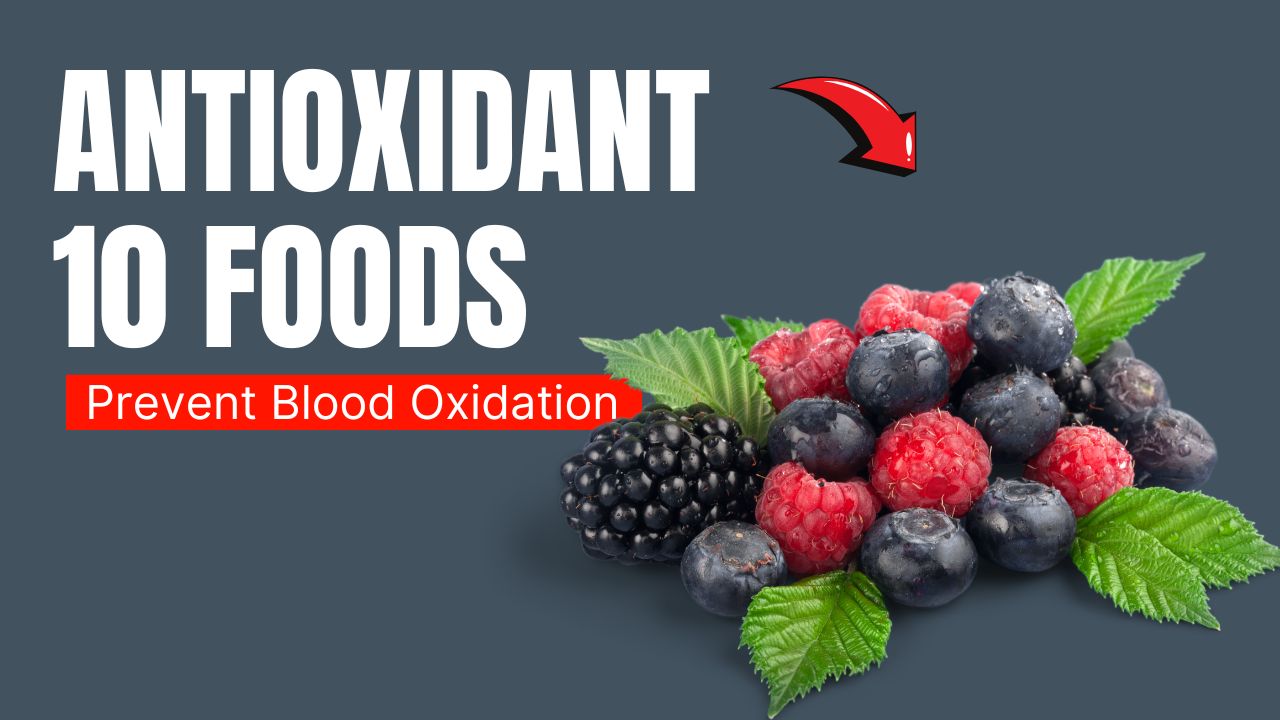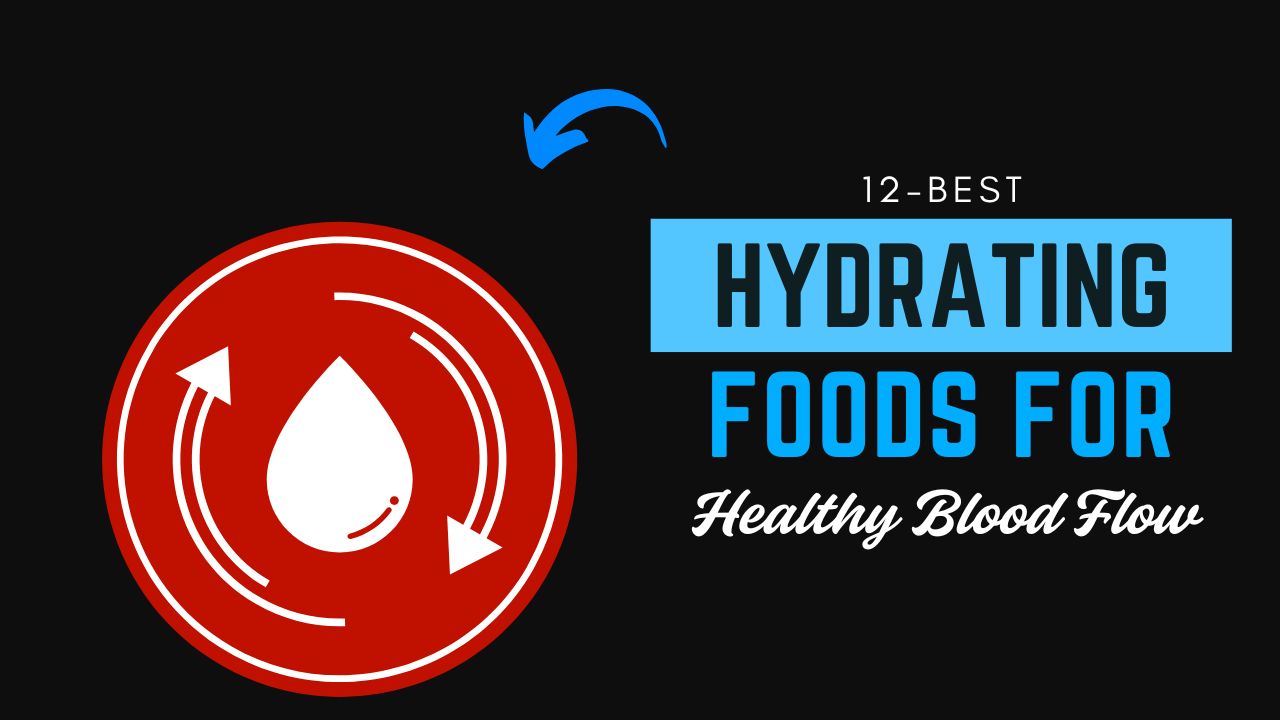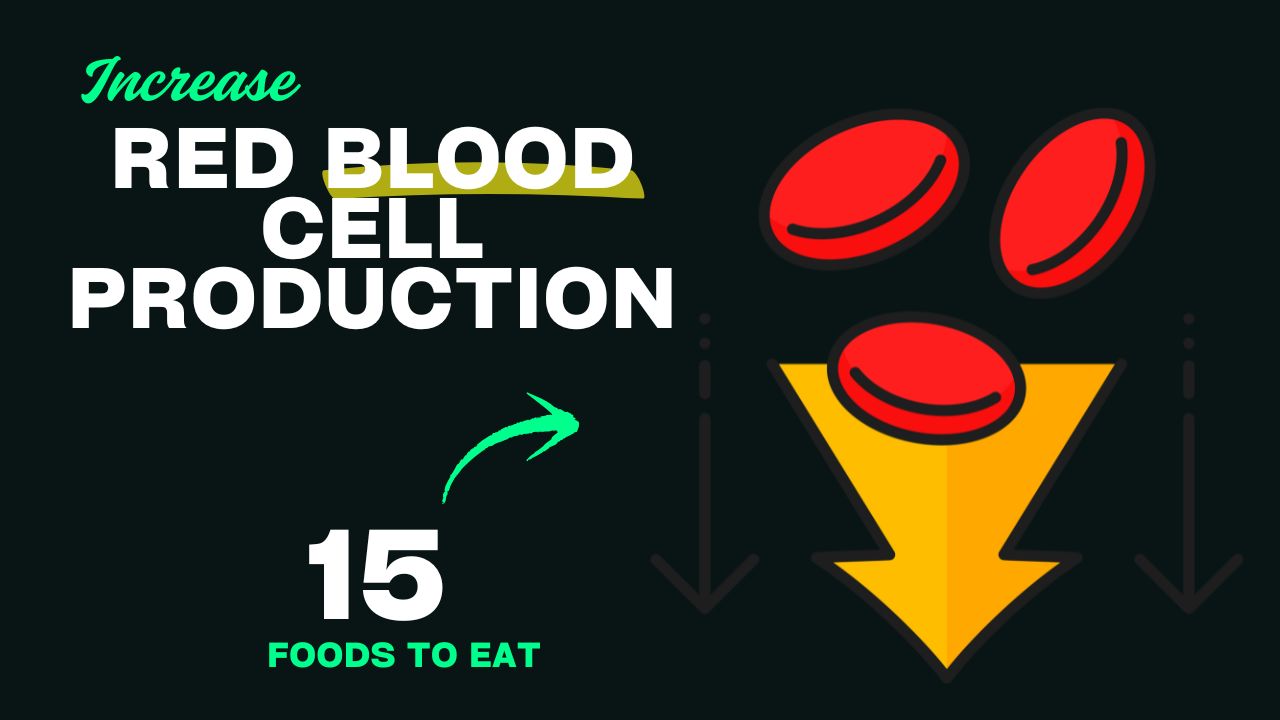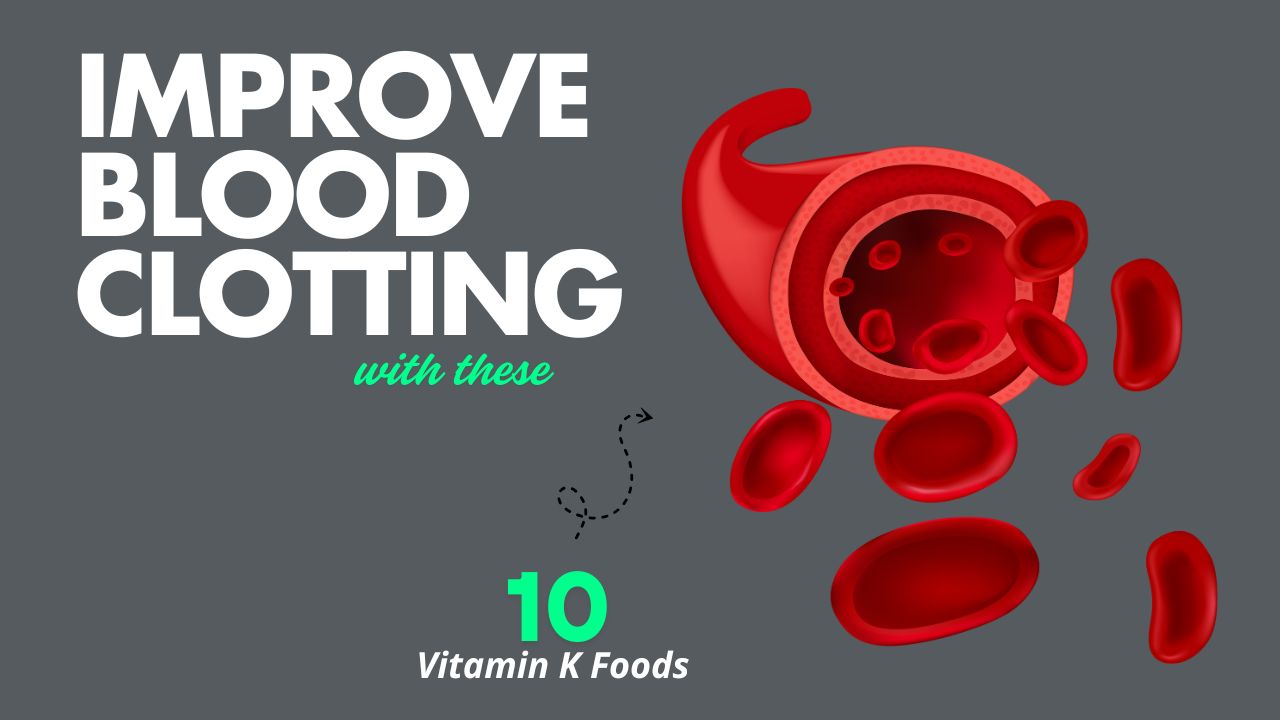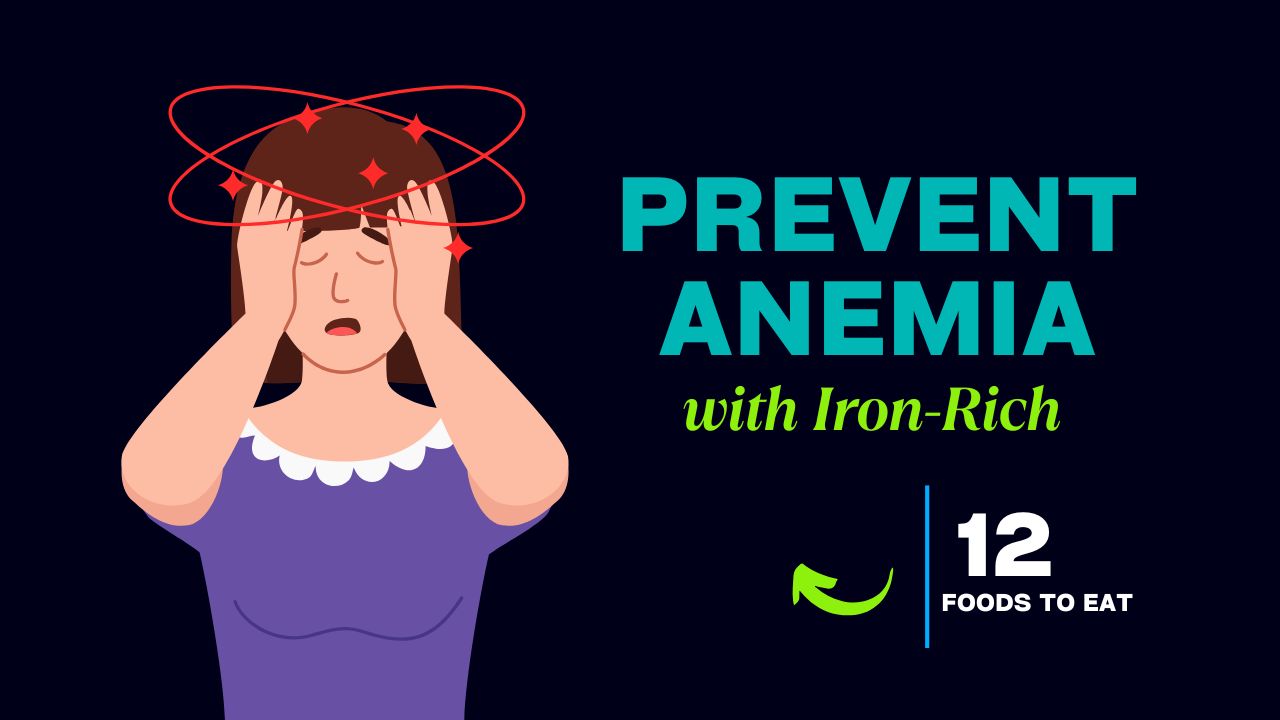Did you know that without Vitamin K, even the smallest cut on your skin could keep bleeding far longer than it should?
This essential nutrient plays a crucial role in blood clotting, bone strength, and even heart health. Yet, many people don’t realize just how important Vitamin K-rich foods are in their daily diet.
Here’s the surprising part: unlike other vitamins that often make headlines—like Vitamin C for immunity or Vitamin D for bones—Vitamin K rarely gets the attention it deserves.
In fact, researchers have found that many adults don’t get enough Vitamin K from food alone, which can lead to delayed wound healing, bone weakness, and in severe cases, dangerous internal bleeding.
In this article, we’ll explore 10 Vitamin K foods that naturally improve blood clotting, along with practical tips on how to eat them, who should focus on adding them to their diet, and a few considerations to keep in mind.
Whether you’re an athlete, a parent, or simply someone who wants better long-term health, these foods deserve a spot on your plate.
Let’s dive in!
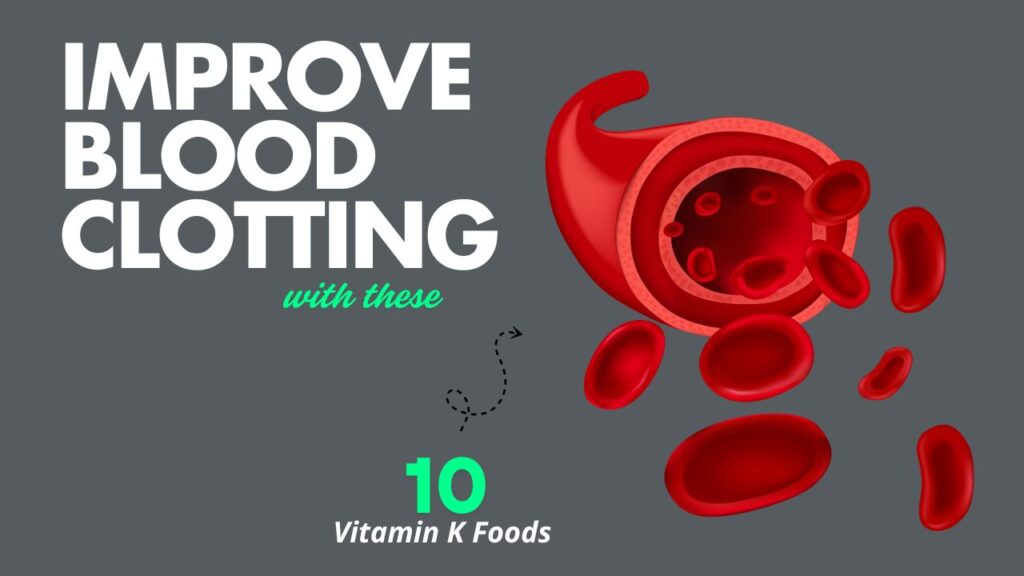
Table of Contents
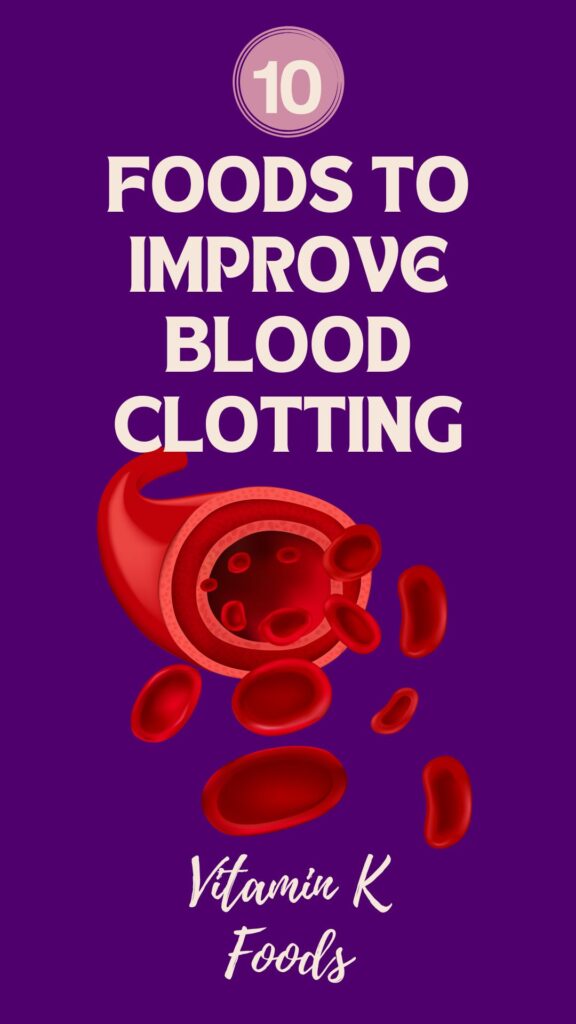
10 Best Foods To Improve Blood Clotting
1. Kale
Kale is often called a “superfood,” and when it comes to Vitamin K, it tops the charts. Just one cup of raw kale provides more than seven times the daily recommended amount of Vitamin K.
Best Ways to Eat or Use It
- Add raw kale to smoothies for a nutrient boost.
- Sauté lightly with olive oil and garlic for a warm side dish.
- Bake kale chips for a crunchy snack.
Who Should Eat / Avoid
- Good for: People with weak bones, athletes needing joint support, and individuals looking for anti-inflammatory benefits.
- Avoid/Limit if: You are on blood-thinning medications like warfarin (consult a doctor first).
Storage & Buying Tips
- Choose kale with firm, dark green leaves.
- Store in the fridge wrapped in a damp paper towel.
- Use within 3–5 days for maximum freshness.
2. Spinach
Spinach isn’t just for Popeye—it’s one of the richest sources of Vitamin K. A single cup of raw spinach offers almost 150% of your daily needs.
Best Ways to Eat or Use It
- Toss fresh spinach into salads.
- Blend into smoothies with fruits for a mild taste.
- Lightly steam and add to omelets or pasta.
Who Should Eat / Avoid
- Good for: Pregnant women (it also has folate), growing children, and weight-watchers due to its low calorie count.
- Avoid/Limit if: You have kidney stones, since spinach is high in oxalates.
Storage & Buying Tips
- Look for crisp, vibrant leaves without slimy spots.
- Store unwashed spinach in a breathable bag in the fridge.
- Consume within 3–4 days for peak nutrient content.
3. Broccoli
This cruciferous vegetable is not only high in Vitamin K but also packed with Vitamin C and fiber.
Best Ways to Eat or Use It
- Steam lightly to retain nutrients.
- Roast with a sprinkle of sea salt and olive oil.
- Add to stir-fries for a crunchy, healthy boost.
Who Should Eat / Avoid
- Good for: Those aiming for better digestion and stronger immunity.
- Avoid/Limit if: You suffer from thyroid issues, as too much raw broccoli may interfere with thyroid function.
Storage & Buying Tips
- Choose tightly packed, green florets.
- Store in a perforated bag in the fridge.
- Best used within 5 days.
4. Brussels Sprouts
Often misunderstood, Brussels sprouts are a powerhouse of Vitamin K and antioxidants.
Best Ways to Eat or Use It
- Roast with balsamic glaze for a sweet, nutty flavor.
- Shave raw into salads for crunch.
- Steam and pair with lemon juice.
Who Should Eat / Avoid
- Good for: People looking to support heart and gut health.
- Avoid/Limit if: You experience bloating easily, as they can cause gas.
Storage & Buying Tips
- Select small, firm, bright green sprouts.
- Keep in a cool refrigerator drawer.
- Use within 7 days for best flavor.
5. Cabbage
Cabbage, whether green or red, is another budget-friendly source of Vitamin K.
Best Ways to Eat or Use It
- Ferment into sauerkraut for gut-boosting probiotics.
- Add shredded cabbage to soups and stir-fries.
- Use raw in coleslaw.
Who Should Eat / Avoid
- Good for: Digestive health and immune support.
- Avoid/Limit if: You are prone to excessive gas or bloating.
Storage & Buying Tips
- Choose cabbage heads that are firm and heavy.
- Store in a cool, dry place or fridge.
- Lasts up to 2 weeks when refrigerated.
6. Collard Greens
Collard greens are a Southern classic and one of the richest sources of Vitamin K.
Best Ways to Eat or Use It
- Sauté with onions and garlic.
- Steam and serve with lemon juice.
- Use as a wrap instead of tortillas.
Who Should Eat / Avoid
- Good for: Bone health, especially in older adults.
- Avoid/Limit if: You are on blood-thinning medications.
Storage & Buying Tips
- Look for firm, dark green leaves.
- Refrigerate in a plastic bag with holes for ventilation.
- Use within 4 days for freshness.
7. Parsley
Surprisingly, this common herb is loaded with Vitamin K. Just a small handful provides more than your daily requirement.
Best Ways to Eat or Use It
- Sprinkle fresh parsley over soups, stews, and salads.
- Blend into sauces like chimichurri.
- Mix into green juices.
Who Should Eat / Avoid
- Good for: People looking to boost flavor and nutrition naturally.
- Avoid/Limit if: You have kidney issues, as parsley is high in oxalates.
Storage & Buying Tips
- Choose vibrant green bunches without yellowing.
- Store in a glass of water in the fridge.
- Lasts up to 1 week.
8. Asparagus
Tender, green asparagus spears are another excellent source of Vitamin K.
Best Ways to Eat or Use It
- Grill with olive oil and lemon zest.
- Steam lightly and serve as a side.
- Chop raw into salads for a crunchy twist.
Who Should Eat / Avoid
- Good for: Athletes, as it helps muscle recovery and hydration.
- Avoid/Limit if: You have gout, since asparagus is moderately high in purines.
Storage & Buying Tips
- Select firm stalks with tight tips.
- Store upright in water, covered with plastic wrap.
- Best eaten within 3–4 days.
9. Prunes (Dried Plums)
A lesser-known source of Vitamin K, prunes also support digestive health.
Best Ways to Eat or Use It
- Snack on a few dried prunes daily.
- Add to baked goods for natural sweetness.
- Mix into oatmeal or yogurt.
Who Should Eat / Avoid
- Good for: People with constipation or weak bones.
- Avoid/Limit if: You’re watching sugar intake, as prunes are calorie-dense.
Storage & Buying Tips
- Choose prunes that are moist and soft.
- Store in an airtight container.
- They last for months if stored properly.
10. Green Beans
Often overlooked, green beans offer a decent dose of Vitamin K along with fiber and antioxidants.
Best Ways to Eat or Use It
- Steam or sauté with olive oil.
- Toss into salads or casseroles.
- Add to soups for extra nutrition.
Who Should Eat / Avoid
- Good for: Weight-loss seekers, thanks to their low calorie content.
- Avoid/Limit if: You have irritable bowel syndrome (IBS), as they may cause digestive discomfort.
Storage & Buying Tips
- Pick firm, bright green beans.
- Store in the fridge in a paper bag.
- Use within 4–5 days.
Do’s & Don’ts (Quick Table)
| ✅ Do | ❌ Don’t |
|---|---|
| Eat Vitamin K foods fresh for maximum nutrients | Overcook vegetables, as it destroys Vitamin K |
| Pair greens with healthy fats (olive oil, avocado) for better absorption | Store leafy greens too long before use |
| Wash and dry produce before storage | Ignore possible drug interactions (check with your doctor) |
| Incorporate a variety of Vitamin K foods daily | Depend only on supplements instead of whole foods |
Possible Side Effects
While Vitamin K foods are generally safe, there are some things to keep in mind:
- Excessive intake can interfere with blood-thinning medications.
- Some foods like spinach and parsley are high in oxalates, which may contribute to kidney stones in sensitive individuals.
- Overeating dried fruits like prunes may cause digestive upset due to high fiber content.
Conclusion
Vitamin K might not be the most talked-about nutrient, but it plays a life-saving role in your body’s ability to stop bleeding, strengthen bones, and support cardiovascular health.
By adding foods like kale, spinach, broccoli, and even prunes into your daily meals, you can naturally boost your Vitamin K intake and improve your overall well-being.
The best part? These foods are versatile, delicious, and easy to incorporate into everyday meals. Start by choosing one or two from this list and add them to your shopping basket this week.
Have you tried any creative recipes with Vitamin K-rich foods? Share your favorite ideas in the comments—I’d love to hear how you use them in your meals!
Frequently Asked Questions (FAQs)
What is Vitamin K and why is it important?
Vitamin K is a fat-soluble vitamin that plays a critical role in blood clotting, bone strength, and heart health. Without it, your body would struggle to stop bleeding from even minor cuts.
How much Vitamin K do I need daily?
The recommended daily intake is around 90 mcg for women and 120 mcg for men, though needs may vary depending on age, health, and medical conditions.
Can I get enough Vitamin K from food alone?
Yes, most people can meet their Vitamin K needs by eating leafy greens, cruciferous vegetables, and certain fruits like prunes. Supplements are generally only needed if recommended by a doctor.
Do cooking methods affect Vitamin K levels in foods?
Yes. Overcooking leafy greens can reduce Vitamin K content. Steaming, sautéing lightly, or eating foods raw are the best ways to preserve nutrients.
Can too much Vitamin K be harmful?
It’s rare to get too much Vitamin K from food. However, high doses of supplements may interfere with certain medications, particularly blood thinners.
Who should avoid eating large amounts of Vitamin K-rich foods?
People on anticoagulant drugs like warfarin should monitor Vitamin K intake carefully, as it may reduce the medication’s effectiveness.
Are there two types of Vitamin K?
Yes. Vitamin K1 (phylloquinone) is found mostly in plant foods like leafy greens, while Vitamin K2 (menaquinone) is found in fermented foods and some animal products. Both are important for health.
Do Vitamin K foods help with bone health?
Yes. Vitamin K helps regulate calcium in the body, supporting stronger bones and reducing the risk of fractures.
Can children and pregnant women eat Vitamin K-rich foods?
Absolutely. In fact, Vitamin K is especially important during growth and pregnancy for healthy bones and blood clotting. Pregnant women should include safe amounts of Vitamin K foods in their diet.
